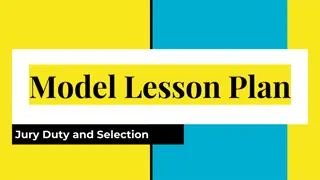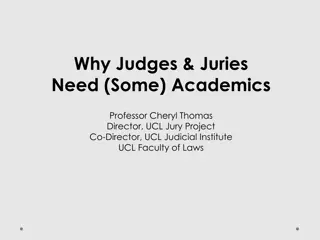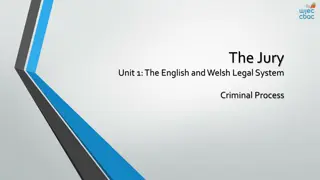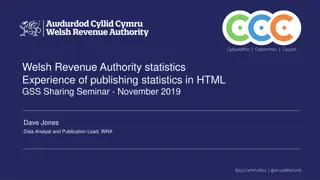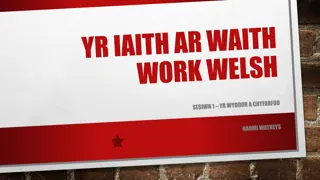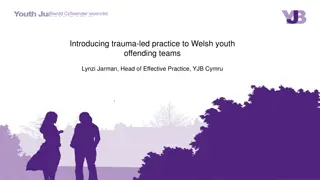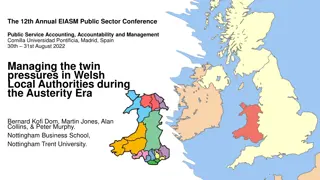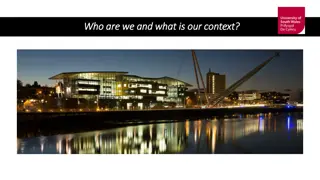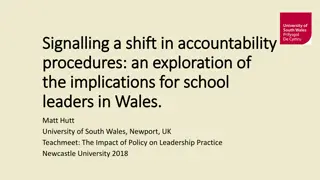Understanding the English and Welsh Legal System: The Role of Juries
Explore the history of jury trials, jury selection processes, and the significance of juries in the criminal justice system. Delve into the civil jury system and the role of coroners' courts in utilizing juries for inquiries. Consider reforms and alternatives in jury trials to enhance the judicial process. Gain insights into the origins of jury trials dating back to 1066 and the evolution of trial procedures over centuries.
Download Presentation

Please find below an Image/Link to download the presentation.
The content on the website is provided AS IS for your information and personal use only. It may not be sold, licensed, or shared on other websites without obtaining consent from the author. Download presentation by click this link. If you encounter any issues during the download, it is possible that the publisher has removed the file from their server.
E N D
Presentation Transcript
The Jury Unit 1: The English and Welsh Legal System Criminal Process
Objectives You will be able to : Explain the history of jury trial Explain jury selection Describe the role of the jury within the criminal justice system Explain the role of the civil jury Critically evaluate jury trial and suggest reforms and alternatives Apply your knowledge of juries to given case studies.
The Jury In small groups consider the following questions: 1. 2. What went before jury trial? 3. How many sit on a jury? 4. What courts do they sit in? 5. What type of cases are they involved in? 6. How many cases are they involved in? 7. What qualifications do you need to sit on a jury? 8. What is their role? When did jury trial begin?
History of Jury Trial 1066 TRIAL BY ORDEAL 12th century Trial by peers 1670 BUSHELL S CASE R v Wang ( 2005)
When are Juries Used? Criminal cases either way offences, indictable offences- Crown Court 1% = 30,000 cases Decide whether the defendant is guilty or not guilty beyond reasonable doubt Criminal Justice Act 2003 allows for trial by judge alone if there has been or is a risk of jury tampering R v Twomey (2009) Unanimous and majority verdicts.
The Civil Jury Civil Jury - less than 1% Decide for or against the claimant and, in some cases, the award of damages Supreme Court Act 1981 qualified right to jury trial Malicious prosecution False imprisonment Fraud Defamation Act 2011 removed defamation cases from jury trial.
The Coroners Court A jury of between seven and eleven members may be used to enquire into deaths. The Coroners and Justice Act 2009 has provisions for changes to the use of juries in Coroners Courts. Under this a jury will be used only if: a) There is reason to suspect that the deceased died while in custody and that either: i. the death was a violent or unnatural one, or ii. the cause of death is unknown b) The death resulted from an act or omission of a police office c) The death was caused by a notifiable accident, poisoning or disease. The coroner will commonly direct the jury as to which verdicts are available in a particular case. Example Hillsborough.
History of Jury Trial Juries Act 1974 Jury Qualifications Criminal Justice Act 2003 new provisions jury qualifications Jury tampering ,complex long cases judge alone Criminal Justice and Courts Act 2015 proposes to extend age limit to 75.
The Jury Jury selection - Central summoning Bureau Jury challenging - for cause & stand by R v Andrews(1998) Discharging the jury -Gregory v UK ( 1997).
Qualifications Eligible Aged 18-70 (though the Criminal Justice and Courts Act 2015 proposes to extend this to 75 Registered on the electoral register Resident in the UK, Channel Islands, Isle of Man for at least 5 years since the age of 13 Not disqualified Deferral Anyone can apply to defer their jury duty. Reasons for deferral include examinations, having a holiday booked, wedding, surgery, etc. Jury duty can be deferred once and must be retaken within a 12 month period of the deferral Disqualification Persons on bail Those with serious criminal convictions Mentally disordered persons Excusal Discretionary (Up to the court to grant this) excusal can be applied for by anyone Automatic right of excusal applies to full time serving members of the armed forces and those who have served as a juror in the last two years
The Jury Jury Vetting : R v Sheffield Crown Court, ex parte Brownlow ( 1980) R v Mason ( 1996 )R v Obellim (1996) Are juries representative of society? R v Ford ( 1989) R v Bansal (1985)
The Jury Jury secrecy List the arguments for and against secrecy Contempt of Court Act 1981 R v Mirza (2004) Att Gen v Scotcher ( 2006 ) Jurors and contempt of court
The Jury The Verdict Unanimous and majority verdicts - 1967
Advantages of the Jury System Judge according to conscience: R v Kronlid (1996). R v Ponting(1985). R v Owen (1991). Certainty verdict not open to dispute Public participation- Lord Denning, giving ordinary folk their finest lesson in leadership .
Disadvantages of the Jury System Lack of competence Perverse verdicts Bias Manipulation by defendants Jury nobbling/ tampering No reason given for the decision/ verdict Distress to jury members Cost and time Problems with compulsory jury service Excessive damages in civil cases.
Reform of the Jury Abolishing juries in serious fraud cases Abolishing juries Juries to write down how they reached their verdict 13th person ( qualified) to enter the jury room to advise Defence and Prosecution prepare for the jury a written summary of the case.


